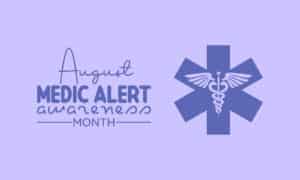
Surprisingly, MedicAlert wasn’t designed for older adults. It was created by a doctor who was out of town when his daughter cut herself while playing and needed stitches. While Dr. Collins knew his daughter was allergic to the tetanus vaccine, doctors at the hospital had no idea. She fell into a coma after getting the shot.
Those are the origins of MedicAlert and the slew of medical alert systems that are on the market today. They’re all a good way to alert medical professionals to allergies, health issues like Alzheimer’s, epilepsy, or diabetes. They’ve also come a long way.
Some medical alert systems have fall detection monitoring built in and put out an alert if the sensor is triggered. They have GPS, which can make it easy to find your mom if she wanders beyond her normal route. A medical alert system is of great benefit to older adults, but 24-hour home care is often a better choice when your mom’s health is worsening. Here are four things medical alert systems can and cannot do.
It Must Be Worn at All Times
If your mom is in the habit of taking off her device to shower or take a bath, she may not have the push button close enough if she falls. Medical alert pendants and wristbands are waterproof. They’re designed to wear in the shower, so your mom needs to get accustomed to that.
It Takes Time for Responders to Arrive
If your mom pushes the button on her wristband or pendant, she’ll talk to a specialist who determines her problem. That specialist then has to alert a family member or paramedic. If your mom is half an hour from the nearest family member or station, she’s going to be alone for that 30 minutes. She’ll still have her specialist on the intercom, but it’s not the same as an actual person.
Fall Detection Isn’t Always Accurate
Most fall detector technology isn’t 100% accurate. Generally, the sensors are alerted by a sudden stop in motion or thudding motion. If your mom swats at a fly and hits the arm of the sofa in the process, it could trigger the fall sensor. Meanwhile, a slow, crumpled fall may not always set it off. Your mom needs to be able to remember to press the button if the sensor doesn’t detect a fall.
There Can Be Hidden Fees
Any medical alert system has a monthly connection fee. This is the fee that covers the service. In addition, some charge installation and set-up fees, extra fees for services like fall detection and GPS tracking, and voice activation. Health insurance doesn’t cover a medical alert system, so this is an out-of-pocket expense each month.
When your mom has a health issue or shouldn’t be alone all night, 24-hour home care is a smart choice. A medical alert system can only do so much. With a person in her home when she’s awake and when she’s sleeping, you have peace of mind that her needs are tended to instantly and there’s no wait for help to arrive. Talk to a specialist in 24-hour home care to learn more.
If you are considering 24-hour home care in The Heights, TX for an aging loved one, please call the caring staff at At Your Side Home Care. We will answer all of your senior care questions. Call today: (832) 271-1600.
At Your Side Home Care, provides exceptional home care for seniors and families in Houston, West Houston, Katy, Memorial, The Heights, Spring Valley, Garden Oaks, Hunters Creek, River Oaks, Hilshire Village, Galleria, Cinco Ranch, Spring Branch, Sugar Land, Missouri City, Richmond, Rosenburg, Piney Point, Bay City and surrounding areas.
Our Certified Nurse Aides, 24-Hour Live-in Assistants and Home Health Aides are available 24 hours a day, 365 days a year. We also provide the security and confidence of 24-hour Telephone Assistance, so fast, reliable help is always available when it's needed. To learn more about our homecare services see our homecare services page.
Different people need different levels of homecare. To meet the requirements of our clients, At Your Side Homecare maintains consistent staffing levels of caring professionals. Homecare service is available for as little as a few hours a week, or as many as 24 hours a day, seven days a week
- What Solutions Can Help Seniors with Mental Health Challenges? - April 18, 2025
- How Does Senior Home Care Help Make Aging in Place Possible? - April 11, 2025
- Best Balance Exercises for Seniors - April 4, 2025



